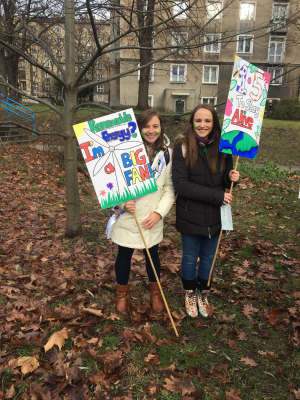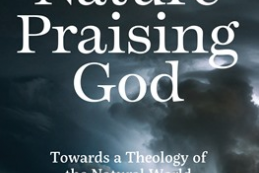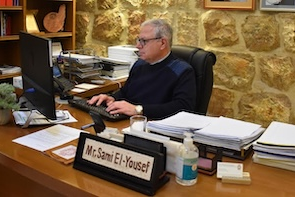CAFOD eyewitness report from COP 24 in Katowice

On 5 December, CAFOD sent a group of 35 climate campaigners to take part in a series of activities around the UN climate meeting near Krakow in southern Poland. This was a mixed group with half being young adults. This group, from dioceses all over England and Wales bonded swiftly over a 24-hour coach journey over the sea and through France, Belgium, The Netherlands and Germany. It felt a bit like a farewell Europe tour given the fever pitch of Brexit talk back home. I do have to admit that after 24 hours on a coach, despite it being the most carbon free method of practical travel, many of us would have had much less back pain had we flown!
The purpose of this trip was not to directly interfere in the negotiations in the In Conference of Parties (COP) meeting. This years COP's purpose has been to formalise the rule book for the implementation of the 2015 Paris agreement. This long and technical process was confined to the conference area. The group from CAFOD came to Poland primarily to raise awareness back home in Britain. Many of our group will be writing articles like this for Catholic and local media. Several of the group have appeared on local radio programs and CAFOD will be issuing press releases.
This awareness raising is more important this year than previous years. The group was lucky to be briefed by representatives from inside the negotiations on several occasions. One of these representatives explained the situation like this. The Paris Agreement came at an alignment of the stars, Obama and America wanted it, David Cameron - despite his many faults - was supportive, China had a progressive administration and Germany and France shepherded the rest of Europe in support of the Agreement. How swiftly those halcyon days have passed. Now America and Russia are throwing all of their support behind coal and gas respectively. The United Kingdom is so fractured, and has a laser focus on Brexit alone, that Theresa May did not visit at all and her representative minister had to miss most of the second week of negotiations due to Conservative infighting. Germany with its 150 coal fired power stations was busy finding a future chancellor. France was busy putting out fires in Paris caused by civil disturbances that were kicked off by an anti-carbon tax increase. The representative from the negotiations effectively said the best we can hope for is minor gains and kick the big decisions into the long grass.
This may sound grim, but despite all the insider politics going on and the negative press reports the CAFOD group encountered a message of positivity. We met with groups of young people under the auspices of CIDSE, an umbrella organisation for Catholic development agencies from Europe and North America. Most European countries as well as several African countries were represented, often in groups of four or five with CAFOD being the largest group. The message that this meeting of nations would want shared is this, if governments won't listen to us and won't live up to their international agreements then we have to start a cultural climate conversion from the bottom up. It starts with us as individuals, spreading the message to our friends and family; spreading it to our local council, our MP and finally our government. If we build this change up from the ground rather than top down the politicians will have to listen or risk being punished at the next election. Interestingly, the best way we as individuals can help the environment, aside from bombarding our MPs with letters, is to walk more for short distances, cut out beef from the diet and recycle everything we can. This may sound absurdly simple, but if 70 million Britons did this it would make a difference.
One day in our time at Katowice was particularly special. On Saturday 8 December all the disparate groups surrounding the COP went on a protest march through the city. With a heavy police presence, including water cannons, the small protest of 3,000 felt a little overawed. Yet for the most part everything passed off peacefully. There were groups from all over the world, religious and non-religious with the one overarching message of '1.5 to stay alive'. This 1.5 degree limit on climate change supports the findings of the Intergovernmental Panel on Climate Change (IPCC), an independent body which states that this is the upper limit of warming to avoid catastrophic damage to the world and society. We were outside saying we need to hit the 1.5 target or people will die, while inside the meeting the USA, Russia and Saudi Arabia were trying to limit the text of the rule book to acknowledge the 1.5 target, while other nations wanted to welcome the target. Around half way round the march a group of anarchists at the back of the march were kettled and the rest of the march stopped in solidarity. Some of us felt like we hadn't achieved much, until later that day when we met with one of the negotiators of the Marshall Islands. He said that whilst he was arguing inside with the climate deniers and the wealthy nations who think it will be cheaper to adapt to climate change rather than stop it - all demoralising and exhausting, just knowing that ordinary people were outside calling for justice reminded him that this isn't an abstract concept. People will die from the impacts of climate change and people want it tackled. He said it energised the meeting.
There wasn't much coverage of the protest in the press, although the Daily Mail was amongst those running online articles. One irking thing about the press coverage was most articles stated, 'environmentalists' protested. We aren't environmentalists; my carbon footprint over the last year would send an environmentalist in to a deep depression. For the most part we were just ordinary people doing our best, and as Catholics we are also answering the call of our Pope to care for our common home.
I was fortunate enough to be asked to talk at a conference organised by Caritas Poland on Laudato Si'. I explained that I have seen the effects of climate change in the UK, Peru and Korea. I have heard from young Catholics from all over the world at a gathering organised by the Missionary Society of Saint Columban and all of them had experienced climate changing in their lifetimes. I have read the warnings of Pope Francis and his ideas on a just and fair world tackling climate change in Laudato Si'. I challenged anyone to see and experience these things and stand idly by. I explained that in my own life I have reduced my plastic use, cut down on my beef and use only public transport. I talked about lobbying my MP, writing articles and talking in schools on the topic of climate change. My faith requires all of this from me because if it is a sin to harm another purposefully then surely it is also a sin to harm others through my own pollution footprint. I know now that what I do here in Britain will affect those in Pakistan, the Pacific islands and elsewhere.
This Laudato Si' conference also heard from Fr Joshtrom Kureethdam, one of the Holy See's delegates to the COP meetings, who focused on the cry of the poor. The world's poor will be the people most affected by the ongoing climate crisis, which will of course fuel mass migration to the 'safe' nations of Europe. If you think the migration crisis is bad, just wait until large portions of the world are underwater or in permanent drought. We also heard from Musamba Mubagna from Caritas Zambia who spoke of the effects of climate change in Zambia and how they are supporting sustainable eco-agriculture. Lastly, we heard from Yeb Sano, a Filipino former lead negotiator and current advisor on climate change to Cardinal Tagle of Manila. He had been part of a group that walked from Rome to Katowice carrying prayers from all over the world which had been written at the World Meeting of Families in Dublin. He reminded us yet again that this is a worldwide issue, that has support from people all over the world.
My father is a man set in his ways; his main concern when it comes to energy isn't carbon emissions but is energy independence. He supports using less plastic, not to save the turtles but to make his daily walk along the River Avon a little nicer and clean up some rubbish. He wants better insulation not to cut down on carbon emissions from the central heating but to keep his hands warm. He is a good and truly decent man and I think his views reflect most people's. So when he asks me why he should do all of the actions to reduce greenhouse gas emissions I am reminded of the words of Cardinal Dew of New Zealand speaking in Dublin in the summer: "After all it is the least we can do for the future generations". When I grew up I was told it will be our children that would be affected by climate change, now I'm being told it is I who will live to see the effects of climate change. Think on that and tell me things haven't gotten worse over the last 20 years. Yet as a Christian I am a person of hope, hope in all things. If we start now and work hard nothing is out of our reach.


















